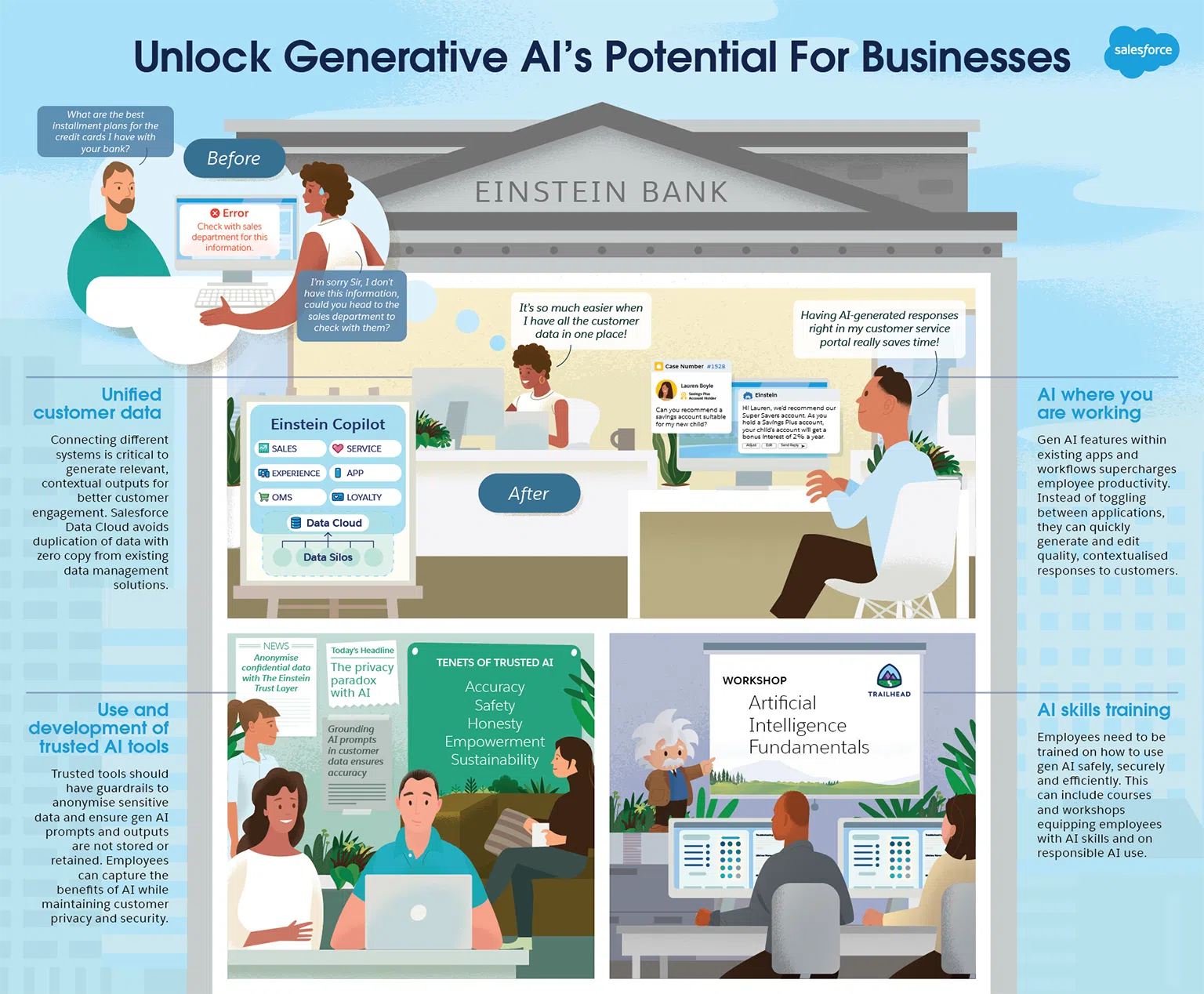Unlock generative AI’s potential: How to position your business for greater success and productivity
According to software giant Salesforce, building a strong data foundation is a crucial first step to making artificial intelligence work harder for you
WHEN a Gucci client advisor responds to a customer inquiry, he or she is able to develop responses in a “Guccified” brand voice with the help of generative artificial intelligence (AI).
For instance, if a customer wants to know how to restore a vintage bag, the advisor can use software giant Salesforce’s Einstein technology to generate bite-size conversation replies in a distinct and authentic brand voice. On top of that, these replies also keep client advisors up-to-date on the fashion house’s newest collections.
Gucci’s 600 client advisors globally have the option of drawing on powerful customer data and insights to enhance productivity while providing better customer experiences.
Sujith Abraham, senior vice-president and general manager of Salesforce ASEAN, says, “Using generative AI as a virtual assistant is a game-changer for employee productivity, and can push the needle in producing fast, brand-consistent and personalised customer experiences.
“But AI is only as good as the data powering it. Generative AI tools that can draw from contextual and relevant company data and metadata will create deeper understanding of customers, and unlock new ways to grow customer relationships.”
Salesforce, a global leader in AI customer relationship management (CRM) solutions, is helping companies like Gucci leverage the power of generative AI. This is especially as interest in generative AI is skyrocketing: In 2023, Open AI’s ChatGPT gained 100 million users in two months, compared to 2.5 years for Instagram to hit that number.
Navigate Asia in
a new global order
Get the insights delivered to your inbox.
According to Salesforce research data, 83 per cent of Singapore IT leaders believe that generative AI will soon have a prominent role in their organisations.
“However, concerns about content inaccuracy and data privacy remain prevalent. More importantly, data silos are still a widespread problem holding businesses back from using generative AI more effectively,” Abraham says.
Disconnected data silos
Salesforce survey data finds that 48 per cent of Singapore business leaders lack a good understanding of data and how to use it, leading to a lack of critical insight into their businesses’ true growth potential.
Says Gavin Barfield, chief technology officer and vice-president of solutions at Salesforce ASEAN: “Companies use a multitude of apps for different purposes. As a result, customer data is spread across different systems such as CRM, data lakes and warehouses, legacy systems and other corporate systems, resulting in fragmented views of a customer.”
For instance, the customer service team may have data on a customer’s queries and issues stored in a separate system from the marketing team, who has the same customer’s data stored elsewhere in the system, leading to an incomplete view of the customer.
Barfield says: “Our research shows that as many as 71 per cent of apps within Singapore organisations are not connected with each other. As generative AI needs to be trained on data that gives a full view of the customer, it cannot be put to good use when a company’s data is not unified and connected across different divisions.”
Another major obstacle is the lack of workers who are skilled in using generative AI tools responsibly and competently.
Salesforce survey data reveals that when asked, nine out of 10 Singaporean workers were unable to identify all the actions associated with using AI ethically and safely.
“Some companies have banned the use of ChatGPT in the office because there is no way to stop employees from uploading confidential data when creating prompts. But banning it may not be the solution. Companies need to find a safer and trusted way for employees to access generative AI in order to reap its benefits,” says Barfield.
To help companies unlock the benefits of generative AI, Salesforce has been actively sharing these key steps with their customers:
1. Create a strong data foundation
The first step is to build a strong data foundation that becomes a unified view of the customer for all employees. Salesforce Data Cloud helps businesses consolidate data from multiple systems easily, without replication or duplication from existing data management solutions.
Take the story Formula 1, the world’s most prestigious motor racing competition with 500 million fans worldwide. Previously, customer data was isolated across digital and physical systems as fan interactions varied across channels such as F1 TV, social media, and in-person race-day events.
With Salesforce Data Cloud, Formula 1 was able to break down the silos and connect all of its fan data across properties in real-time. In unifying data from multiple systems, Formula 1 delivers meaningful interactions for fans and bolsters customer loyalty.
2. Integrate AI seamlessly into workflows
Generative AI solutions are most effective when they reside within an employee’s existing systems and workflows. This helps supercharge employee productivity by minimising the need to toggle between systems.
Put into practice, this means that every time a customer sends a question, customer service agents can use integrated AI assistants like Einstein Copilot to generate replies right within the conversation portal – making it easier for them to resolve customer issues quickly. Multiply this across the hundreds of customer cases that agents need to resolve on a daily basis, and you can imagine the time saved.
3. Use trusted AI tools
Salesforce has developed a trusted AI architecture that is designed to ensure AI and data safety and security. This way, companies can achieve industry trust standards quickly without compromising customer data.
Salesforce customers already conduct a trillion transactions a week, and now they can use the Einstein Trust Layer to generate content while protecting sensitive customer information. For example, it can automatically mask customer names, while ensuring that the generated content is “grounded” in actual company data so there is a low risk of hallucination.
4. Build an AI-empowered workforce
Finally, companies need to begin setting up clear frameworks for AI usage and train their staff to use generative AI tools effectively and ethically.
Abraham says: “The most important thing is to get employees to understand how they can use generative AI in their daily work, while being mindful of potential risks and ethical concerns.”
Salesforce helps companies learn how to use AI responsibly on its free online learning platform Trailhead, with dedicated modules such as “Ethical Data Use in Personalisation” and “Ethical Data Use Best Practices”.
“Once the initial hesitation is overcome, many workers will realise how generative AI can help them work smarter and more productively, while opening up new and better ways to augment their human skills,” Abraham adds.
For more information, visit this website.


Copyright SPH Media. All rights reserved.
